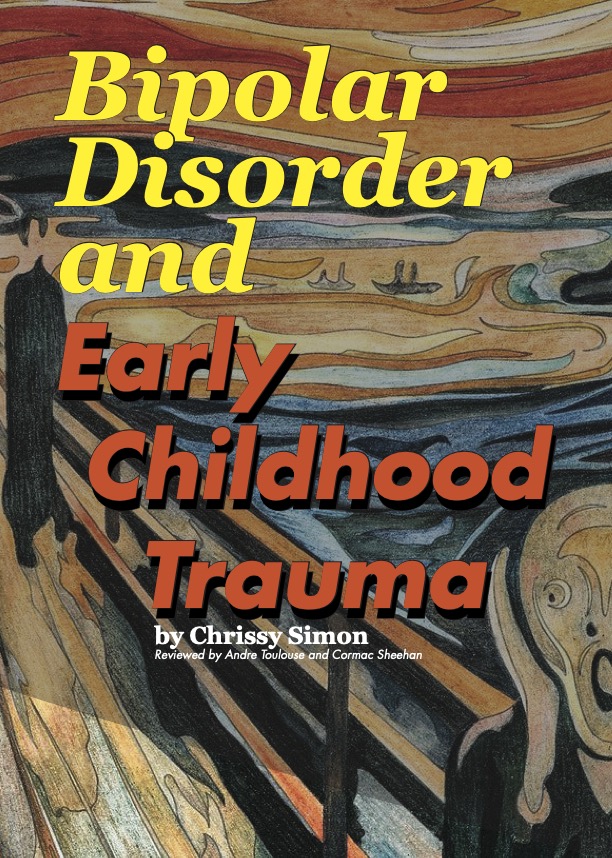Bipolar disorder and early childhood trauma
DOI:
https://doi.org/10.33178/SMJ.2021.1.8Keywords:
bipolar disorder, early childhood traumaAbstract
Case Background
There is a reported 48.8 million case of bipolar disorder (BD) world- wide. It can also be one of the most challenging disorders to manage clinically as patients often have poor medical compliance and numerous relapses throughout their lifetime. The etiology of this illness is still poorly understood, but it is recognized to compromise both genetic and environmental factors. Regarding the latter, abuse and instability in childhood and adolescence was reported as an important area of consideration in regard to the development and prognosis of bipolar disorder.
We report here the case of a female who exemplifies the significance of early childhood experience in this disorder.
Case Presentation
Isabelle is a 21 year old, female, with a background history of bipolar disorder. She presented to the Cork University Hospital accident and emergency 2 weeks after discharge after a 4 week admission for a depressive episode. Isabelle was referred from the home-based team with an acute episode of mania and was detained involuntarily under the Mental Health Act. Her history is significant for childhood neglect, physical, emotional and sexual abuse, along with multiple foster care placements. She was managed as an inpatient with antipsychotics and a mood stabilizer before being discharged after a lengthy, arduous, admission.
Conclusion
Childhood trauma is an important consideration in BD. Therefore, practitioner awareness of the role of such trauma with regard to its etiology and prognosis is of great importance. It is also essential to the practice of preventive medicine.
Patient Consent Obtained: Yes
References
Binesh-Marvasti, T., McQueen, S., Ahmed, W., Frankfurter, C., Sorouri, K. and Faheim, M. (2018). Toronto Notes 2018.
Dualibe AL, Osório FL. Bipolar disorder and early emotional trauma: a critical literature review on indicators of prevalence rates and clinical outcomes. Harvard review of psychiatry. 2017 Sep 1;25(5):198-208.
de Codt A, Monhonval P, Bongaerts X, Belkacemi I, Tecco JM. Bipolar disorder and early affective trauma. Psychiatr Danub. 2016 Jan 1;28(Suppl 1):4-8.
Carballo JJ, Harkavy-Friedman J, Burke AK, Sher L, Baca-Garcia E, Sullivan GM, Grunebaum MF, Parsey RV, Mann JJ, Oquendo MA. Family history of suicidal behavior and early traumatic experiences: additive effect on suicidality and course of bipolar illness? Journal of Affective Disorders. 2008 Jul 1;109(1-2):57- 63.
Mortensen PB, Pedersen CB, Melbye M, Mors O, Ewald H. Individual and familial risk factors for bipolar affective disorders in Denmark. Archives of general psychiatry. 2003 Dec 1;60(12):1209-15.
Liu D, Diorio J, Tannenbaum B, Caldji C, Francis D, Freedman A, Sharma S, Pearson D, Plotsky PM, Meaney MJ. Maternal care, hippocampal glucocorticoid receptors, and hypothalamic-pituitary-adrenal responses to stress. Science. 1997 Sep 12;277(5332):1659-62.
McGowan PO, Sasaki A, D’alessio AC, Dymov S, Labonté B, Szyf M, Turecki G, Meaney MJ. Epigenetic regulation of the glucocorticoid receptor in human brain associates with childhood abuse. Nature neuroscience. 2009 Mar;12(3):342.
Cakir S, Tasdelen Durak R, Ozyildirim I, Ince E, Sar V. Childhood trauma and treatment outcome in bipolar disorder. Journal of Trauma & Dissociation. 2016 Aug 7;17(4):397-409.
Martins DS, Hasse-Sousa M, Petry-Perin C, Arrial-Cordeiro RT, Rabelo-da-Ponte FD, Lima FM, Rosa AR, Bücker J, Gama CS, Czepielewski LS. Perceived childhood adversities: Impact of childhood trauma to estimated intellectual functioning of individuals with bipolar disorder. Psychiatry research. 2019 Apr 1;274:345-51.
Jiménez E, Solé B, Arias B, Mitjans M. Varo C, Reinares M, Bonnín CD, Ruíz V, Saiz PA, García-Portilla MP, Burón P. Impact of childhood trauma on cognitive profile in bipolar disoder. Bipolar Disorders. 2017 Aug 19; (5):363-74.
Mulholland CC, Maguire C, McCusker CG, Meenagh C, Shannon C. The effects of trauma on bipolar disorder: the mediational role of interpersonal difficulties and alcohol dependence. Bipolar Disorders. 2007;9:1-0.
Shannon C, Hanna D, Tumelty L, Waldron D, Maguire C, Mowlds W, Meenagh C, Mulholland C. Reliability of reports of childhood trauma in bipolar disorder: a test–retest study over 18 months. Journal of Trauma & Dissociation. 2016 Aug 7;17(4):511-9.
Leverich GS, McElroy SL, Suppes T, Keck Jr PE, Denicoff KD, Nolen WA, Altshuler LL, Rush AJ, Kupka R, Frye MA, Autio KA. Early physical and sexual abuse associated with an adverse course of bipolar illness. Biological psychiatry. 2002 Feb 15;51(4):288-97.
Etain B, Mathieu F, Liquet S, Raust A, Cochet B, Richard JR, Gard S, Zanouy L, Kahn JP, Cohen RF, Bougerol T. Clinical features associated with trait-impulsiveness in euthymic bipolar disorder patients. Journal of Affective Disorders. 2013 Jan 25;144(3):240-7.
Garno JL, Gunawardane N, Goldberg JF. Predictors of trait aggression in bipolar disorder. Bipolar disorders. 2008 Mar;10(2):285-92.
Ferrari AJ, Stockings E, Khoo JP, Erskine HE, Degenhardt L, Vos T, Whiteford HA. The prevalence and burden of bipolar disorder: findings from the Global Burden of Disease Study 2013. Bipolar disorders. 2016 Aug; 18(5):440-50.

Published
License
Copyright (c) 2024 Chrissy Simon

This work is licensed under a Creative Commons Attribution-NonCommercial 4.0 International License.









